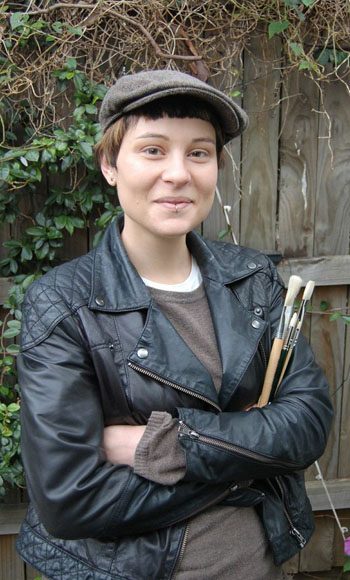Although Serbian artist, Jovana Terzic, has been in Australia less than 12 months, the Belgrade-born 30 year old is awe-struck by Australia. “My expectations have been far exceeded,” she says, in an interview in her studio in George Street, Redfern. She is thrilled to have gained the South Sydney Uniting Church artist residency, an event she describes as a happy set of coincidences.

Classically trained in Belgrade, Jovana studied at the College for Design and then five years at the Academy of Fine Arts. “I had five years, a traditional, very classical education. We were taught many techniques, as well as anatomy, life drawing and still life.”
The hard part has been to liberate and develop her personal style. “We had a few really good professors and artists, but Serbia is still a bit isolated. I used to travel but not a lot because of visa restrictions.”
Jovana tried to keep track of what was happening in the contemporary European art scene and travelled to Poland and Finland, but a trip to Kenya and Egypt was the turning point for a new way of thinking about her art practice. She was inspired by the fecundity she encountered and the notion of the plentiful Earth, and that Africa is the cradle of humankind.
She describes her work as “inspired by nature and our human place in this big order. I have my own personal mythology through which I try to communicate with others.”
It is a world of thoughts, different characters and real-life inspiration. Her work has been described as whimsical. She says simply that she doesn’t try to force anything in her work, allowing her subconscious to “do the thing”.
“People have said ‘everyone is good in your paintings’. I am inspired by light and darkness, the dual character of everything. I am conscious of both, but the positive comes out.”
Jovana was 10 when the former Yugoslavia went to war, tearing itself apart in a vicious civil war. She is reluctant to talk about her experiences, but gives the impression of a deep world-weariness. “I was 10 years old, not really affected. People have been in a worse situation.” She shrugs, then adds: “You are a kid, it makes a scar. There are always good and bad people but you never know – does society make good individuals or good individuals make good society?”
She is struck by the sense of freedom she has encountered in Sydney and the artistic possibilities it offers. “I can feel vitality here, people take action, people ask questions.”
Serbia is the result of one big state, Yugoslavia, being divided up. For Jovana, it has been a regressive step. “The intellectual elite are chased from the country, young people, good artists, thinkers chased away. Arts and sciences are not supported. But without people who think differently, others find it easier to rule.”
A new Serbian pro-nationalist government recently replaced a “progressive pro-European” administration. Now installed in Belgrade, it offers a dog-whistle call to all the bad old Serbian tendencies. “Australia is somehow innocent, you look at the future and change it. Tradition is good but it’s heavy to get rid of. Here people are making the vibe of the place, how you feel. I don’t feel like a stranger here. It’s easy, people are easy-going, everything is flowing. If there is a problem then it’s solved in a way and you continue.”




